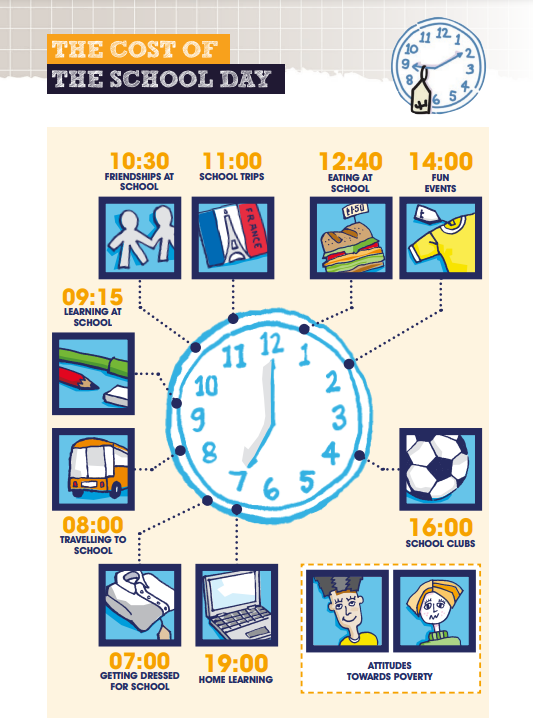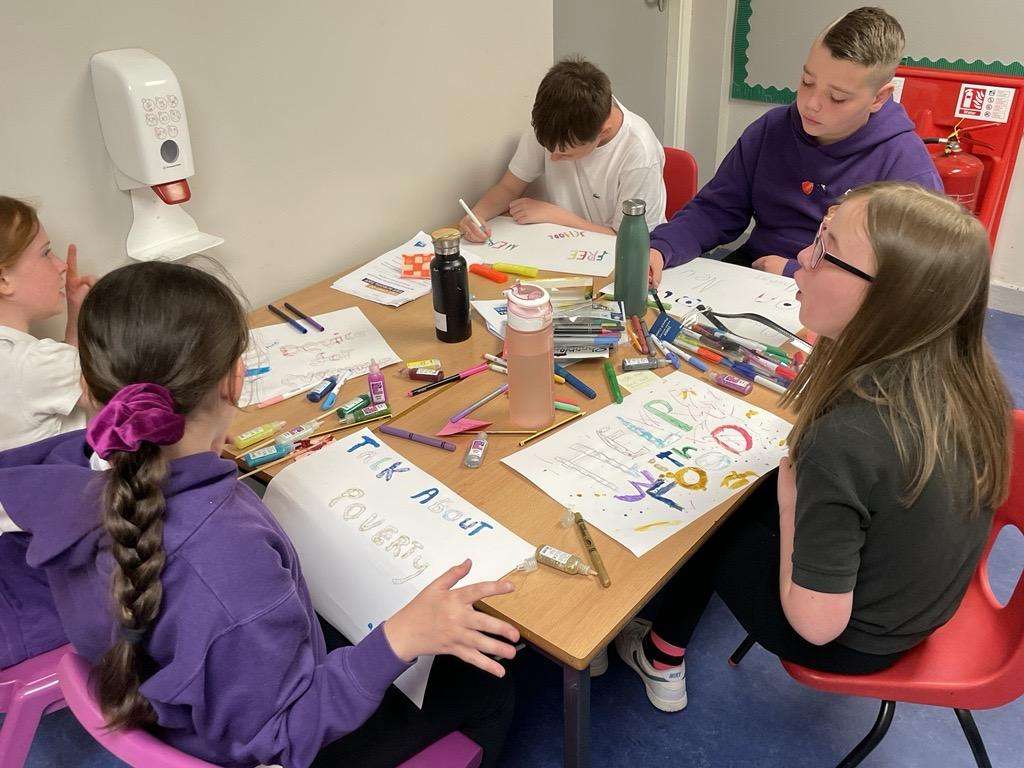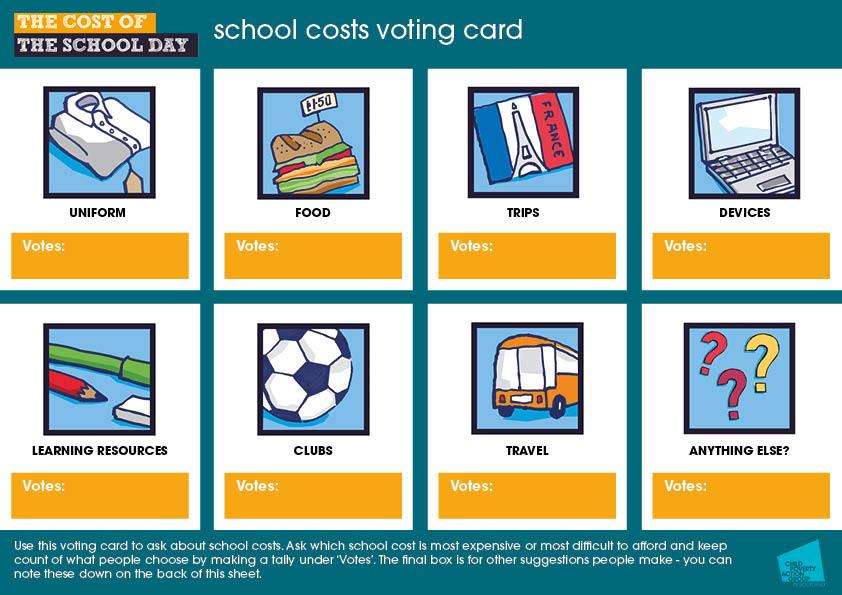It's entirely up to you which activities you decide to try, and you can do them in whatever order you'd like.
If your school isn't already part of the Cost of the School Day Voice network, and you'd like your young people to get the chance to take part in meetings, events and activities, just sign up to get started.
1. Write a school costs survey
An activity to help you find out what others at school think about costs and which ones might be a problem.
This is a good way to reach lots of people and get their views. You could design surveys to find out what other pupils, parents and even members of staff think about costs. There are example surveys in the Cost of the School Day Toolkit Step 2 - have a look at pages 21, 33 and 51 for ideas. Your survey can be as short or as long as you like, but shorter surveys usually mean more people take part.

Write a school costs survey .pdf

Boghall Primary School group
2. Create a focus group
An activity to help your group find out people's views and opinions.
Focus group discussions can help you find out people’s ideas and opinions about a particular subject. Voice network groups have run discussions on lots of different topics, including uniform costs and the school canteen.
When you run your own focus groups, it's helpful to decide:
- What you want to find out about. Write a list of questions and make sure none of them are too personal. You don’t want to put people on the spot or embarrass them.
- Who you want to talk to. Whose opinions and ideas are you interested in? Are there particular year groups or types of pupil or parent that you want to hear from?
- What you’re going to do with the information and where you’re going to share it in the school. Who needs to hear about this topic?
Recruit people to take part
You might want to involve other teachers in your school to help.
- Pick a time and place that might work for the people you want to speak with.
- Groups of between 4 and 8 people are a good size to be able to chat comfortably.
- Reassure people that what they say will be kept confidential. This means sharing what’s been said but not who said it. For example, you might tell your head teacher that: “We heard from pupils that the canteen is too busy,” rather than “Kelly in S2 said that the canteen is too busy.”
Prepare for the session
- What roles will you take? You’ll need people to ask questions, keep an eye on time and make sure that what’s being said is being written down or recorded in some way.
- Look again at your questions. Have you covered everything?
- Think about how you might manage different types of people. How will you encourage quiet people to speak up or make sure the discussion isn’t taken over by a chatty person?
- Make sure you’ve got a comfortable space for people to sit. It’s great if you can offer drinks and snacks too.
Run the focus group
- Introduce your group, what you’re going to talk about and why it’s important.
- Do a round of introductions. You can do a quick game to kick things off if you like.
- Remind people of confidentiality and what you’re going to do with what’s been said.
- Ask your questions. You can use prompts like:
- "Can you tell me more about that?"
- "Why do you think that?"
- "Does anyone else have anything to say about that?"
- "Does everyone agree with that?"
- Make sure you keep to time. You don’t want to get through only half of the questions. You can move people along by saying: "Thanks for that. Now we’re going to move on to the next question."
Listen carefully and show that you’re interested. People will take part and enjoy it more if you do. When you’re finished, thank people for taking part and tell them again what will be done with the information.
Create a focus group .pdf
3. Set up a suggestion box
Help your group find out what other people at school think about costs at school.
You'll need a sealed box - a cardboard box is fine - which you can cut a slot for posting suggestions. You might want your suggestion box to be about one specific thing, maybe ‘How can uniforms be cheaper?’ or ‘What can we do to make sure everyone can afford to come and have fun at the Christmas fair?’
This is a really good anonymous way to ask questions, and it can help you get honest answers or suggestions as people don’t feel embarrassed about telling you things.
Set up a school suggestion box .pdf

4. Costs voting cards
An activity to help your group find out more about the views of other people in your school, particularly those relating to school costs.
We have three voting card templates to help you find out about costs in your school.
This voting card template will help you collect information from lots of people quickly. You could use it at lunchtime or breaktime or any time that you can speak to lots of people. Ask each person which of these school costs is most expensive or most difficult to afford and keep count of what people choose by making a tally under ‘Votes’. The final box is for other suggestions people make. You can note these down on the back of the sheet.
This Christmas template has lots of empty boxes for you to write in Christmas costs in your school. Things like fayres, pantomimes, parties, teacher presents, Christmas jumper day, or anything else. Ask people which of these might be difficult to afford and keep count of what they choose by making a tally under 'Votes'. Remember to include a box for suggestions of things you might not have thought of. Note these down on the back of this sheet
You can add your own costs to this blank template and use it at any time during the year. In the boxes on the voting card draw and label or write down some of the costs in your school then use it in exactly the same way as you used the first and second one.
You can use these templates with lots of pupils in your school either by going round classrooms, during tutor time or PSHE, asking pupils to add their votes during break time in the corridors, or in the playground. You can also ask parents to use the voting cards at home.
Once you've collected everyone's votes, you can add them up to find out the most common cost worry, then rank them in order from highest to lowest priority. Can you put them into percentages?
This exercise will help your group understand whole-school priorities and which areas they might like to start addressing first.
The templates for this activity can also be found in the downloadable PDF below.
Costs voting cards .pdf
5. Talking to parents
Helping your group to ask parents and carers about school costs.
Voice groups can help to ask families what they think about costs. Boghall Primary School in West Lothian created a film and posted it on X/Twitter to involve parents and get them to fill out a costs survey.
You can show the film, Talking about Costs and Money at School to other people in your school, including parents and carers. This short animation explains why it's good for schools and families to talk about costs.
Talking to parents.pdf
Irvine Royal Academy, Auchenharvie Academy and West Calder High School interviewed their Headteachers - see how they got on
6. Talking to your headteacher
In this activity you will interview your headteacher about costs and help at school, and work with them to come up with a Cost of the School Day pledge for your school.
This is a great way to find out what your school is doing to make school affordable for all. It can also help your headteacher to think about what more could be done to reduce costs and support everyone. You can suggest your own ideas!
Getting started
Your group leader or teacher can help you set up the meeting, and you might want to send your headteacher. Here are some words you could use in your invite:
Dear (name)
We would like to invite you to an interview where we are going to explore how our school is tackling the cost of the school day.
Would you be able to meet us on (add in day and date) at (time) in (venue) to chat further about what we do in our school, and other things we could do to make sure school costs are not a worry for pupils and families.
Headteacher homework
To help your headteacher understand some of the things young people say about the Cost of the School Day, you can set them homework and ask them to watch the Big Question film before you meet with them!
Take a look yourself too. Do you agree with what children and young people say?
Question ideas to get you started
- What did you learn from young people in the Big Question film?
- What do you think we do well to help with the Cost of the School Day? What's the best thing?
- How do we tell our families about free school meals and other help with money?
- How much do you know about what pupils and families think about school costs?
- What ways do we help families who might be worried about affording a school trip or other activities?
- Is there anything new you would like to do to help with the cost of the school day?
Remember to think about:
- Who will interview your headteacher?
- How long will the interview last?
- Where and what time will it take place?
- Who will ask the questions? You might like to take it in turns.
- How will you record the answers? You could write them down or record them on your phone
- You could take pictures of the meeting to share more widely - who will take them and who will be in them?
Your school's Cost of the School Day pledge
Work with your headteacher to come up with a Cost of the School Day pledge You can take a picture of your headteacher and you holding the pledge, and ask them to share your pledge on the school's social media, to show everyone how your school challenges poverty.
Talking to your headteacher.pdf
Take part
If your school isn't already part of the Cost of the School Day Voice network, and you'd like your young people to get the chance to take part in meetings, events and activities, just sign up here.